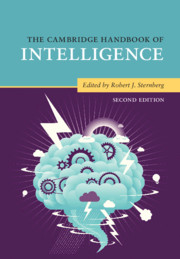Book contents
- The Cambridge Handbook of Intelligence
- The Cambridge Handbook of Intelligence
- Copyright page
- Dedication
- Contents
- Figures
- Tables
- Contributors
- Preface
- Part I Intelligence and Its Measurement
- Part II Development of Intelligence
- Part III Intelligence and Group Differences
- Part IV Biology of Intelligence
- Part V Intelligence and Information Processing
- Part VI Kinds of Intelligence
- Part VII Intelligence and Its Role in Society
- Part VIII Intelligence and Allied Constructs
- 42 Intelligence and Personality
- 43 Intelligence and Achievement
- 44 Intelligence and Motivation
- 45 Intelligence and Creativity
- 46 Intelligence and Rationality
- 47 Intelligence and Wisdom
- 48 Intelligence and Expertise
- Part IX Folk Conceptions of Intelligence
- Part X Conclusion
- Author Index
- Subject Index
- References
47 - Intelligence and Wisdom
from Part VIII - Intelligence and Allied Constructs
Published online by Cambridge University Press: 13 December 2019
- The Cambridge Handbook of Intelligence
- The Cambridge Handbook of Intelligence
- Copyright page
- Dedication
- Contents
- Figures
- Tables
- Contributors
- Preface
- Part I Intelligence and Its Measurement
- Part II Development of Intelligence
- Part III Intelligence and Group Differences
- Part IV Biology of Intelligence
- Part V Intelligence and Information Processing
- Part VI Kinds of Intelligence
- Part VII Intelligence and Its Role in Society
- Part VIII Intelligence and Allied Constructs
- 42 Intelligence and Personality
- 43 Intelligence and Achievement
- 44 Intelligence and Motivation
- 45 Intelligence and Creativity
- 46 Intelligence and Rationality
- 47 Intelligence and Wisdom
- 48 Intelligence and Expertise
- Part IX Folk Conceptions of Intelligence
- Part X Conclusion
- Author Index
- Subject Index
- References
Summary
This chapter reviews both the empirical evidence and the prevalent theoretical positions on the relationship between wisdom and intelligence. In short, wisdom includes aspects of intelligence but is far more than “just” intelligence. Wisdom integrates the ability to think about complex issues in a complex way with certain personality facets such as openness to experience and empathy with others, motivational facets such as a deep curiosity about the fundamental questions of the human existence, and a willingness to critically reflect upon oneself, and ethical facets, such as a concern for a greater good that is strong enough to overrule more egoistical or self-enhancing goals. Together, these different components lead individuals to acquire a strong body of broad and deep knowledge about the human existence that makes these individuals a source of advice on how to live a good life.
Keywords
- Type
- Chapter
- Information
- The Cambridge Handbook of Intelligence , pp. 1140 - 1158Publisher: Cambridge University PressPrint publication year: 2020
References
- 4
- Cited by



